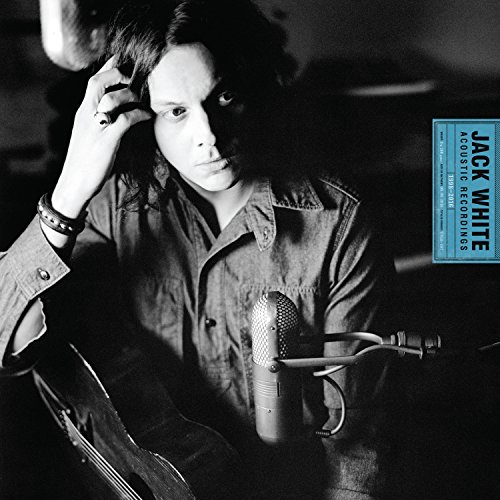
Jack White
Acoustic Recordings 1998-2016
Release Date: Sep 9, 2016
Genre(s): Pop/Rock, Alternative/Indie Rock
Record label: Third Man Records
Music Critic Score
How the Music Critic Score works
Buy Acoustic Recordings 1998-2016 from Amazon
Album Review: Acoustic Recordings 1998-2016 by Jack White
Great, Based on 10 Critics
Based on rating 8.0/10
Detroit is a city of extremes—of Fortune 500 wealth and epidemic poverty, of beautiful art-deco landmarks and ruins that are so apocalyptic, they’ve spawned a mini-tourism industry. Native son Jack White has likewise displayed a fondness for blinding contrasts, and the White Stripes’ candy-cane dress code was the least of it. Over the years, White has gamely pit bluesy authenticity against bullshit artistry; virtuosity against amateurism; punk credibility against Hollywood celebrity; small-business boosterism against Coca-Cola shilling.
Based on rating 4/5
The cover of Jack White’s first ever career-spanning compilation seems significant. Long-term watchers of the former White Stripe’s career might sigh: so what else is new? Virtually every album White has released thus far has come wrapped in a sleeve rich in meaningful imagery: the crowds of shadowy photographers supposedly representing the White Stripes’ conflicted attitude to fame on 2001’s White Blood Cells; the shot of him brooding, with a vulture on his shoulder, that heralded his post-divorce solo debut Blunderbuss. But what’s striking about the cover of Acoustic Recordings 1998-2016 is that there’s nothing striking about it at all.
Based on rating 8/10
Natural-born archivist that he is, it is no surprise that Jack White would eventually choose to curate his own career. Acoustic Recordings 1998-2016 is his first attempt at offering an alternative narrative of his own career, one that places his quieter side as the connecting thread running from the White Stripes through the Raconteurs to his solo work. It's a tactic that diminishes some of the conventional notions about White, particularly that most of his music is grounded in the blues.
Based on rating 4/5
The 26 songs on this collection – album tracks, B-sides and previously unreleaseds from the White Stripes and Jack White's solo career – celebrate a moment before music was claimed by genre, when sounds were still taking shape and rules had yet to be written. They slip from blues to country to gospel to Sixties rock and back in a blink, exchanging spontaneity and craft so effortlessly there's no discernible difference between the two. A newly available White Stripes track (the first since 2008), "City Lights," starts off with a circular acoustic riff sprung from a back-country road.
Based on rating B
There’s nothing wrong with enjoying Jack White’s music on a surface level. You know, simply because you might be a “blues rock fan” or because his tunes are often uncannily catchy. But that approach discounts the fact that nothing he creates — whether it’s the six albums with The White Stripes, the three with The Dead Weather, the two with The Raconteurs, or the two he released under his own name — is ever obvious or without some ounce of complexity.
Based on rating 7/10
With names like Kanye, Beyonce and Taylor Swift occupying the top of music charts and the front pages of tabloid newspapers, the music industry has come to resemble the old Hollywood star system with its fierce individualism, strictly defined media agendas and public images crafted to a T. In this world, Jack White is a vague, uncategorisable anomaly. His new collection of acoustic recordings covers a considerable chunk of time: a whole 18 years, during which he moved through different musical projects and styles (The White Stripes, The Raconteurs, solo work), but when presented as a whole, this anthology feels oddly scattered, elusively concealing any recurring patterns or trajectories.
Based on rating 3/5
In case you hadn’t noticed, Jack White’s a little bit into the blues. There he is, underpinning the documentary American Epic, or reviving an old Son House recording for The White Stripes’ De Stijl. Fittingly, he also featured in It Might Get Loud, alongside Jimmy Page, a man whose electric – and electrifying – reconfiguration of the music easily set a template for Jack and his mainstream emergence as one half of The White Stripes.
Opinion: Absolutly essential
The real joy, however, comes in the shape of songs you might have forgotten about, like the logic-twisting wordplay of ‘Effect And Cause’ (“First came an action, and then the reaction / But you can’t switch ’em round for your own satisfaction”) or ‘Carolina Drama’, whose white-trash murder balladry represents the high watermark of The Raconteurs’ brief two-album existence.‘Acoustic Recordings’ is a selective, rather than exhaustive, portrait of White as an artist, but for a guy who’s spent most of the 18 years this compilation spans dogmatically adhering to self-imposed restrictions, there’s a remarkable amount of diversity here – and not a clunker to be found. .
Opinion: Excellent
Jack White is a musical anachronism. The idiosyncratic songwriter has spent his 20-year career retreating further into the analog charms and weathered songwriting of a bygone era, all while the digital age blossomed venomously around him, forever changing the look and sound of the music industry. While each project White has been involved with – The White Stripes, the Raconteurs, The Dead Weather, and his current solo output – has succeeded in their own right, as an artist Jack has continuously seemed to be in restless, impatient state of transformation, anxious to launch his next endeavor before his current work grows stale.
Opinion: Great
When Jack White debuted The White Stripes in Detroit in 1997, his band had two big selling points. Jack and his then wife Meg produced an explosive blues-rock sound marked by an almost childlike spontaneity and looseness. And they had style. With their stripped-down color palette, The White Stripes made an impact visually as well as audibly.
'Acoustic Recordings 1998-2016'
is available now

